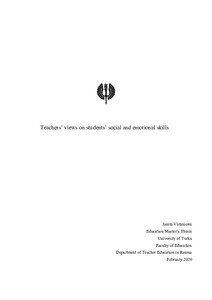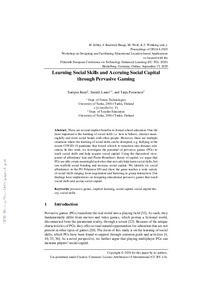Teachers' views on students' social and emotional skills
Viitaniemi, Janita (2020-02-19)
Teachers' views on students' social and emotional skills
Viitaniemi, Janita
(19.02.2020)
Julkaisu on tekijänoikeussäännösten alainen. Teosta voi lukea ja tulostaa henkilökohtaista käyttöä varten. Käyttö kaupallisiin tarkoituksiin on kielletty.
avoin
Julkaisun pysyvä osoite on:
https://urn.fi/URN:NBN:fi-fe202003047285
https://urn.fi/URN:NBN:fi-fe202003047285
Tiivistelmä
The importance of social and emotional skills in schools contexts can be seen both in in research and in the National core curriculum for basic education in Finland. Considering the importance of social and emotional skills for students’ social, personal and academic development as well as the recent emphasis on these skills in Finnish education, the purpose of this study is to explore teachers’ experiences, views and practices in relation to students’ social and emotional learning. Social and emotional skills have a great impact on child’s development, success and future. How teachers view social and emotional skills have an effect on how they address them in their classrooms. Teachers’ ability to implement social and emotional skills education in classroom culture daily affect students’ social and emotional competence.
Considering the importance of social and emotional skills in students’ learning and development and the importance of teachers’ views in shaping their practices of addressing social and emotional skills, the following research questions were asked in this study: 1. What are teachers’ views about students’ social and emotional skills? 2. How do teachers address social and emotional skills for their students?
A survey design was employed as the research method in this study because it enables gathering the ideas of a large group of people about a topic or issue.
The study showed that social and emotional skills are considered to be important by participating teachers. Social and emotional skills were visible in classrooms and were addressed quite often in everyday life as well as with the help of different materials such as KiVa school -materials, Lions Quest and FRIENDS -materials for social and emotional education.
Considering the importance of social and emotional skills in students’ learning and development and the importance of teachers’ views in shaping their practices of addressing social and emotional skills, the following research questions were asked in this study: 1. What are teachers’ views about students’ social and emotional skills? 2. How do teachers address social and emotional skills for their students?
A survey design was employed as the research method in this study because it enables gathering the ideas of a large group of people about a topic or issue.
The study showed that social and emotional skills are considered to be important by participating teachers. Social and emotional skills were visible in classrooms and were addressed quite often in everyday life as well as with the help of different materials such as KiVa school -materials, Lions Quest and FRIENDS -materials for social and emotional education.
Samankaltainen aineisto
Näytetään aineisto, joilla on samankaltaisia nimekkeitä, tekijöitä tai asiasanoja.
-
Learning Social Skills and Accruing Social Capital through Pervasive Gaming
Sampsa Rauti; Samuli Laato; Tarja Pietarinen<p>There are several implicit benefits to formal school education. One the most important is the learning of social skills i.e. how to behave, interact meaningfully and form social bonds with other people. However, there ... -
From digital divide to digital capital: the role of education and digital skills in social media participation
Lybeck Robin; Koiranen Ilkka; Koivula AkiSocial media platforms have become significant media for participating in society. This, and society's digitalization overall, has resulted in concerns regarding access and inclusion. By combining theories of social media ... -
Communication skills predict social-emotional competencies
Rautakoski Pirkko; af Ursin Piia; Carter Alice S.; Kaljonen Anne; Nylund Annette; Pihlaja Päivi<div><p><em>Introduction:</em> Studies have shown that many children with early language difficulties also have delays in social-emotional competencies as well as social-emotional and behavioral problems. It is unclear if ...



